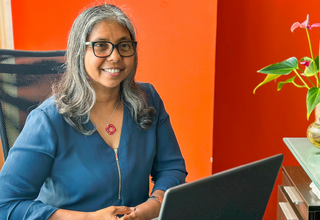Around 200 youth on Monday (11 July 2016) participated in the United Nations Population Fund’s (UNFPA) launch in a series of nation-wide dialogues on how the future development of the Maldives should take shape.
The event was the first national conversation among citizens on the shifting population dynamics in the Maldives and the impact it will have on determining the country’s future development path.
The launch entitled “Fahi Oiyvaru” which in Dhivehi translates as “favourable sea currents” and refers to “topical issues” was held at the Maldives National University (MNU) in the capital Male’. The event was held on the occasion of the annual World Population Day.
The interactive discussion was based on a new report supported by UNFPA and the Republic of the Maldives which was published on the same day entitled “Maldives' Population Dynamics: Policy Prospects for Human Growth and Opportunity.” The report was authored by Professor John F. May and handed over in an official ceremony to the Minister of Education, Her Excellency Dr. Aishath Shiham, Minister of Finance and Treasury, His Excellency Mr. Ahmed Munawar and Mr. Alain Sibenaler, UNFPA’s Country Director to the Maldives.
Mr. Sibenaler who participated in the debate, said the forum is meant to be “the launching pad of a series of conversations, where young people, especially boys and girls can express their views, concerns and suggestions that can help steer future policy directions needed to devise short, medium and long-term strategies to address future population challenges.”
He added that as the Maldives are currently experiencing a “demographic dividend” or “population bonus” there is a need to boost investment in the country’s youth as it will have a lasting impact on the society as a whole and its population.
The Maldives national Housing and Population census in 2014 showed that nearly 50 percent of the total population is currently under the age of 25. “To ensure that everyone are part of the conversation, sometimes we have to look beyond data and statistics. If we are able to link the demographic dividend to the digital connectivity of the youth, in particularly young women, their views can also be used to influence policies,” said Mr. Sibenaler.
Aishath Shahuda, Chief Statistician at the Maldives National Bureau of Statistics said that the “Census is still a key source of reliable information needed to analyse what is going on within a population. A census gives basic information on all data relating to economy, education, fertility etc, which can also be used for research purposes.”
Professor John F. May also participated in the discussion. He gave a presentation of the findings, highlighting the three key challenges which the Maldives need to address such as: improving reproductive health outcomes and gender equality, capturing the country’s first demographic dividend and addressing internal and international migration issues. “There is a limited window of opportunities to take advantage of the new demographic trends and to use its population structure for rapid and social development, provided the right mix of investment and policies are put in place for the country’s young people, the reproductive health and in gender equality… There is no one size fits all solution. Therefore we need to bring all of the sectors together to come up with a solution. Today’s event is one way of ensuring that everyone is heard.”
A census quiz which was developed by the UNFPA, NBS and telecommunications service provider Ooredoo was launched after the conclusion of the discussion. UNFPA’s youngest team member, Ms. Aishath Imthaau Binth Ismail had the honour of officially launching the quiz.




